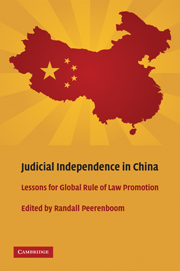Book contents
- Frontmatter
- Contents
- Contributors
- 1 Introduction
- 2 Halfway Home and a Long Way to Go
- 3 A New Approach for Promoting Judicial Independence
- 4 The Party and the Courts
- 5 Judicial Independence in China
- 6 A New Analytic Framework for Understanding and Promoting Judicial Independence in China
- 7 Judicial Independence and the Company Law in the Shanghai Courts
- 8 Local Courts in Western China
- 9 The Judiciary Pushes Back
- 10 Corruption in China's Courts
- 11 A Survey of Commercial Litigation in Shanghai Courts
- 12 Judicial Independence in Authoritarian Regimes
- 13 Judicial Independence in East Asia
- Index
- References
7 - Judicial Independence and the Company Law in the Shanghai Courts
Published online by Cambridge University Press: 05 June 2012
- Frontmatter
- Contents
- Contributors
- 1 Introduction
- 2 Halfway Home and a Long Way to Go
- 3 A New Approach for Promoting Judicial Independence
- 4 The Party and the Courts
- 5 Judicial Independence in China
- 6 A New Analytic Framework for Understanding and Promoting Judicial Independence in China
- 7 Judicial Independence and the Company Law in the Shanghai Courts
- 8 Local Courts in Western China
- 9 The Judiciary Pushes Back
- 10 Corruption in China's Courts
- 11 A Survey of Commercial Litigation in Shanghai Courts
- 12 Judicial Independence in Authoritarian Regimes
- 13 Judicial Independence in East Asia
- Index
- References
Summary
The essence of corporate and commercial laws is to protect business and commerce from the threat of political power.
– Zheng Guanying (1893)This chapter draws on a detailed study of corporate law adjudication in Shanghai from 1992 to 2008. The purpose of the study was to better understand the demonstrated technical competence, institutional autonomy, and political independence of one court system in the People's Republic of China (“PRC”) in a sector outside of the criminal law. The study consisted of a detailed examination and comparison of full-length corporate law opinions for more than 200 reported cases, a 2003 Shanghai High Court opinion on the 1994 Company Law (describing a decade of corporate case outcomes), a 2007 report on cases implementing the Company Law in 2006 (more than 760 cases), and extensive interactions with Shanghai court officials handling such disputes – all for a wide diversity of Shanghai jurisdictions and procedural postures. Due to space limitations, this chapter focuses on the demonstrated independence, and to a lesser extent autonomy, of the Shanghai courts when faced with a completely altered Company Law.
THE NEW JUSTICIABILITY OF THE COMPANY LAW
Corporate law theory holds that in jurisdictions like the PRC, where the judiciary is regarded as underdeveloped, buffeted by political and other external pressures, and deficient in handling complex cases, company law must be largely self-enforcing and may not be structured to “depend on fast and reliable judicial decisions.
- Type
- Chapter
- Information
- Judicial Independence in ChinaLessons for Global Rule of Law Promotion, pp. 134 - 153Publisher: Cambridge University PressPrint publication year: 2009
References
- 5
- Cited by

